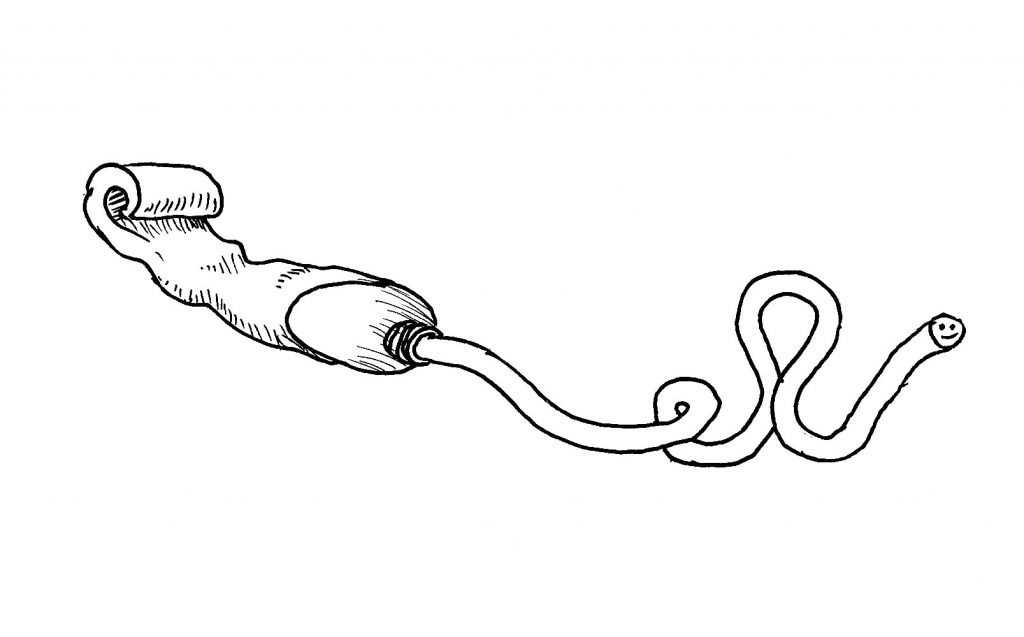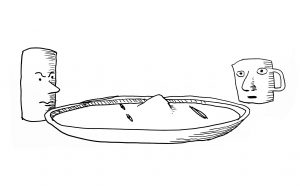PACS Blog / December 7, 2020
Why Kindness Is a Winning Campaign Tactic
By: Eric Krebs @ericjohnkrebs
THIS Q+A IS PUBLISHED AS PART OF AN ONGOING SERIES INTERVIEWS WITH MEMBERS OF STANFORD’S POLARIZATION AND SOCIAL CHANGE LAB

Politics can be a brutish place, full of low-blows and Twitter attacks. But nearly lost in all this mudslinging is a critical question: Are these tactics effective?
Jeremy Frimer doesn’t think so. In fact, Frimer thinks the incivility that politicians increasingly flaunt along hyper-partisan lines is actually costing them — and, by proxy, all of us.
In the latest in our series of conversations with researchers from Stanford University’s Polarization and Social Change Lab, Frimer reveals the counterintuitive findings of his studies on civility in politics: namely, that the public is turned off by negative campaigning, which ultimately ends up hurting the image of the attacking politician more than the one being attacked. He spoke to us about the methods used to evaluate responses to incivility, the ramifications of their surprising conclusions, the pitfalls of politics built only on tone — and where to go from here.
This interview has been edited for length and clarity.
What’s your central area of research?
I study American politics, political polarization, and how people feel about each other on the other side and within the same side. The central finding in my research is things are not as bad as they seem.
You have a paper called “The Montagu Principle: Incivility decreases politicians’ public approval even with their political base.” What is the Montagu Principle?
Mary Wortley Montagu was an 18th century author, and she once said “civility costs nothing and buys everything.” For someone to come along and make such a strong claim like that, I think it’s provocative and it’s counter to a lot of our intuitions. Yet the evidence seems to support it.
How does this square with the fact that incivility seems to be really popular, and really effective?
So the manifestation of this, if you can envision it, is a Trump rally. So you can just picture Donald Trump standing up at a rally and ripping and tearing into whoever his perceived political opponent is, and the crowd going absolutely wild when he says something particularly provocative and inflammatory and uncivil about the other side. And so commentators, a number of commentators, pundits and journalists have even Nancy Pelosi has used the term “throwing red meat to the base” to capture that phenomenon. The robust finding is that if one politician attacks the other, the attacker takes a bigger hit to their reputation than the person who’s attacked.
[This idea] leads to a testable hypothesis: when a politician attacks the other side with incivility, will that boost that politician’s approval with their most diehard supporters? That was an idea floating around in the media and popular culture that as far as we knew had not ever been tested. The point of our paper was to test that and see, is that the case? Do people generally receive incivility from their cherished leader positively?
How did your study work and what did you find?
We focused on President Trump, although it’s important to note that these effects are not limited to President Trump. We gathered together President Trump’s daily approval ratings from publicly available polling data over the first year of his presidency. We also gathered information about the number of insults he issued on Twitter, which is sort of a level of incivility. The New York Times documents every single insult he’s ever issued on Twitter. If the insults were well received, then we should expect that more insults equals greater approval. But we find the opposite. The more insults, the lower his approval. We broke it down by the political identity of respondents and found the same effect. We’re still finding negative associations between approval and insults. More insults, lower approval — even among conservatives.
You did another longitudinal study analyzing over 200 million words from the Congressional Record. How did you do that?
We looked at all of the words spoken on the floor of the U.S. Congress since the mid ’90s. There are ways to code incivility in text using computers. We use a basic software called Linguistic Inquiry and word count, which starts with a preset dictionary. It looks at a text and asks how many words in that text match any of those words in the dictionary. Then you divide by the total number of words to get a density of that topic.
Crushed by negative news?
Sign up for the Reasons to be Cheerful newsletter.
One way you can tell someone’s being civil is that they’re using honorifics, which would be calling someone by their title like “President,” “Mister,” “Mayor” or “Congresswoman.” To ramp up your civility, one would generally want to use tentative language like “I suggest” or “it might happen,” as opposed to language like “it definitely is.”
We also looked at first-person and second-person. Civility theory suggests that one should use impersonal language like “we” and even passive voice to communicate, as opposed to the more direct and clear “I” and “you.” So “I want this” as opposed to, “you know, this might be helpful.” It’s subtle, but it actually does work. We analyzed the civility of what members of Congress had to say and found that they were again correlated and longitudinally predictive of lower approval: more civility, higher approval.
How do you control for outside variables that might also have an effect on approval ratings?
We try to measure other factors that we think might explain the correlation between two variables — in this case, incivility and approval. We use a statistical program to essentially hold those constant hypothetically to ask: What if this weren’t changing, would we still see a relationship between incivility? We did control for political polarization of Congress, so the degree to which the two sides were really far away from each other on policy, which could obviously cause incivility to go up, and also approval to go down because people want Congress to work together. Indicators of economic strength, violence and military might are possible factors that could potentially partly explain why we might observe a correlation between civility and approval. Yet even holding those fixed, we still see that incivility and approval go together, which implies that there might be a direct relationship between approval and incivility.

In addition to studying the president’s tweets and words in the Congressional Record, you conducted some experimental tests, as well. Can you tell us about those?
An experiment requires that we manipulate a variable that we care about. In this case, we think that incivility causes approval to go up or down. Therefore, we randomly assigned people to experience either something civil or uncivil. Then we ask them about how they feel about it.
Study Three was called “President Trump attacks” using a website called Amazon Mechanical Turk, where people basically sign up to do studies and get paid a bit of money to do each one. They’re reasonably representative of the American population and include people on the left, the center and the right. They’re a pretty decent representation amongst different racial and ethnic groups and the genders and education.
We showed half of [the participants] three or four of President Trump’s most egregious, uncivil tweets and then we asked people, “How do you feel about President Trump?” We also asked them their political identity, ranging from a diehard Trump opponent to a regular Trump opponent to being on the fence about President Trump, being a supporter, or even a diehard supporter.
And what were the results?
What we found is that for every group, except for diehard Trump supporters, approval was higher after reading the civil tweets. Uncivil tweets caused approval to decrease among die-hard Trump opponents, Trump opponents, people who are on the fence, and even people who generally support him — but diehard supporters didn’t move. There was no change.
But if the “red meat” hypothesis is right, then we should see an uptick in approval among die-hard fans. We did not see that. It’s always tricky to interpret a null finding because it could be explained by not a big enough sample. But in spite of an honest and well-designed effort to try to find evidence of red meat, of “I love Trump even more because he attacked the other side,” we didn’t find it when we thought we would.
If there’s evidence that being civil is popular, even in a hyper-partisan environment, then why aren’t people and politicians cultivating this behavior?
There are some strong beliefs in the public, and especially among political operatives, about how attacking and incivility actually work. Political operatives say attack ads work. That’s why we go low, why we punch the other side, because it works. It drives people away from the other side and they’re not interested in going to vote. They don’t like them anymore or they’re just not sure about them anymore. But the literature suggests the opposite. The robust finding is that if one politician attacks the other, the attacker takes a bigger hit to their reputation than the person who’s attacked.
And what are the pitfalls to civility?
Other researchers have found that incivility can be a really strong signal to other people about who you are, who you’re loyal to and who’s your tribe. And if you want to be accepted within a particular group, attacking the other side might signal your fidelity and your loyalty to a particular tribe and gain you entry in a way.
Research from William Brady has shown that language expressing outrage — which I think is related to uncivil language — gets a lot more retweets on Twitter. So incivility might get people’s attention and draw attention to something that one sees as problematic.
And what are the consequences of incivility?
There’s a robust literature showing that when politicians are uncivil, it turns people off the system and makes people distrust politicians and have less faith in the government. It doesn’t seem to mobilize the electorate one way or the other, doesn’t change voter turnout, but it does seem to get people’s attention. Incivility takes up all the oxygen in the room. It causes people to ruminate and be distracted and then not be good at whatever else they’re trying to.
Another negative effect of incivility is that it takes up all the oxygen in the room, so it causes people to ruminate and be distracted and then not be good at whatever else they’re trying to. My favorite study on this is that pediatricians were exposed to incivility from their colleagues and it caused them to do a less good job at taking care of infants. This is clearly not retaliation. They’re not taking out their frustration on infants. But incivility caused them to ruminate and be distracted.
From your perspective, what’s the big takeaway from all this research?
I think it would be a mistake to suggest that it’s always worth offending the other side. Americans are not nearly as divided as they seem. There’s really great polling results out there showing that even on policy issues, we think of the other side as being way on one extreme and we’re way on this extreme. And that’s not the case. There’s almost overlap on things like borders and gun control, and people are actually not that far apart on policy. It’s the feeling between the two sides that has grown more and more negative. And feelings can be managed. As Mister Rogers said, anything that’s mentionable is manageable.


